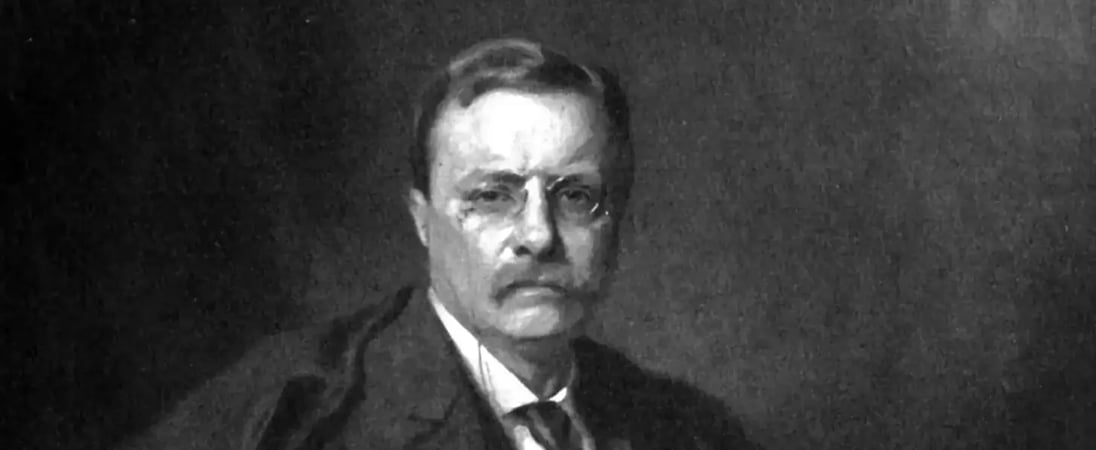
Theodore Roosevelt's birthday
Theodore Roosevelt, born on October 27, 1858, was a man of many roles. He bravely led as America’s 26th President and explored the world as a daring adventurer. Roosevelt also wrote books and cared deeply about nature, creating national parks. His life was full of energy and bold decisions, making him a notable historical figure.
Theodore Roosevelt’s Journey of Growth
Born in New York City, he was a sickly child with asthma. But he didn’t let this stop him. Theodore fought against his illness with exercise and determination. He turned his weaknesses into strengths through sheer willpower.
Education played a big role in his life. He learned at home first, with his parents teaching him. Later, Theodore attended Harvard University, where his love for learning grew. He studied a variety of subjects, from history to biology. These studies shaped his broad range of interests and his future career.
Theodore’s passion for the outdoors began in childhood. He loved exploring nature and was fascinated by animals. This interest led him to write a book on birds when he was just a teenager. His love for the environment would later inspire his efforts to conserve nature as President.
Theodore also showed a strong sense of justice and fairness in his youth. He believed in standing up for what was right. This trait was evident even in his school days. He often took the lead in school projects and debates, showing early signs of the leader he would become. His childhood laid the foundation for his later life, where he championed causes like fairness and environmental conservation.
Theodore Roosevelt’s Success and Achievement
Political and Military Career
Theodore Roosevelt’s rise to prominence began with his political career. He served as New York City’s Police Commissioner, where he fought corruption fiercely. His efforts there earned him national recognition. He then became the Assistant Secretary of the Navy, showing his strategic skills in preparing for the Spanish-American War.
Roosevelt’s military achievements are unforgettable. He led the Rough Riders in Cuba with courage and determination. This volunteer cavalry unit became famous for its bravery, especially in the Battle of San Juan Hill. Roosevelt’s leadership in this battle made him a national hero.
America’s 26th President
As President of the United States, Roosevelt’s successes were many. He worked tirelessly for the common good. He regulated big businesses to protect everyday people. Roosevelt fought for workers’ rights, leading to safer workplaces and fairer wages.
One of his greatest achievements was in conservation. Roosevelt created five national parks and many other nature reserves. He understood the importance of preserving America’s natural beauty. This legacy continues to benefit generations today.
Nobel Peace Prize Winner and Writer
Roosevelt was also a Nobel Peace Prize winner. He earned this honor by mediating the end of the Russo-Japanese War. This achievement marked him as a peacemaker on the world stage.
Beyond politics, Roosevelt was a prolific writer. He authored numerous books on different subjects, including history and nature. His writings reflect his wide range of interests and deep knowledge.
Interesting Facts About Theodore Roosevelt
Avid Boxer: Roosevelt loved boxing and continued the sport in the White House.
Police Reformer: As New York City Police Commissioner, he would often walk officers’ beats late at night to ensure they were on duty.
Animal Lover: He had a variety of pets in the White House, including a badger, a bear, and a hyena.
Blind in One Eye: He lost sight in his left eye due to a boxing injury during his presidency.
Youngest President: Roosevelt became President at 42, making him the youngest ever to hold the office.
Amazon Explorer: After his presidency, he went on an extensive expedition in the Amazon rainforest.
Wounded Orator: He once gave a 90-minute speech after being shot in an assassination attempt, refusing to go to the hospital until he finished.
First American to Win a Nobel Prize: He was the first American to be awarded the Nobel Peace Prize in 1906.
Also on this date...
National American Beer Day
Brewed with passion, American beer is a frothy concoction of hoppy goodness that tantalizes taste buds and leaves us thirsting for more.
National Parmigiano Reggiano Day
Discover the king of cheeses! With its nutty notes and irresistible texture, this Italian delight adds a delicious touch to any dish.
National Black Cat Day
A perfect companion for those who appreciate a little bit of edge in their lives, these feline friends are sleek and stylish, with a touch of mystery.




